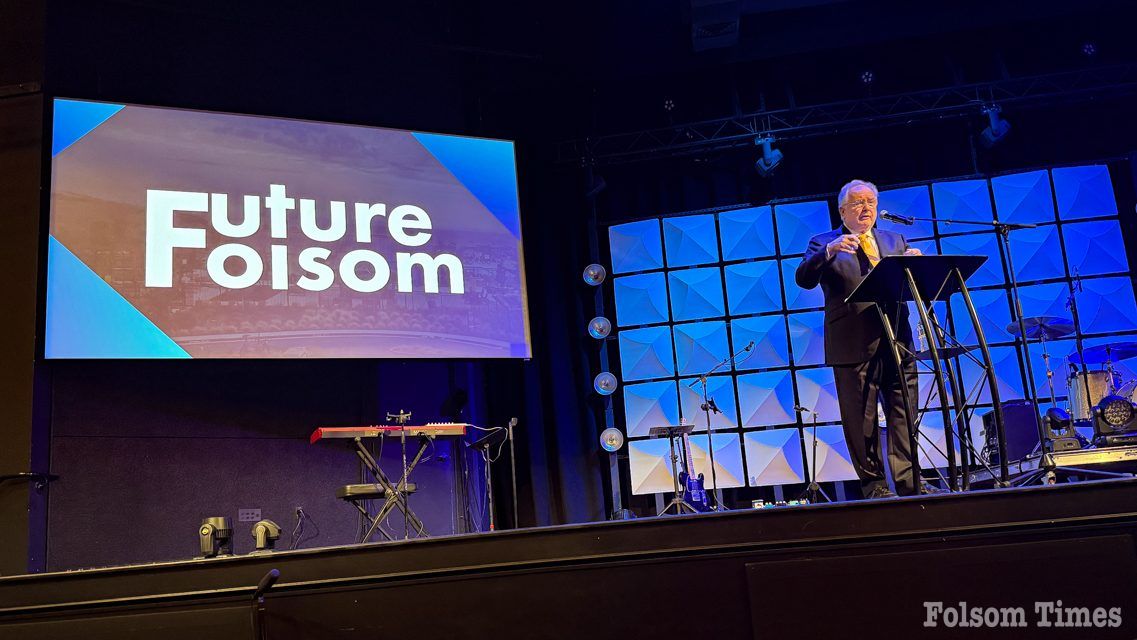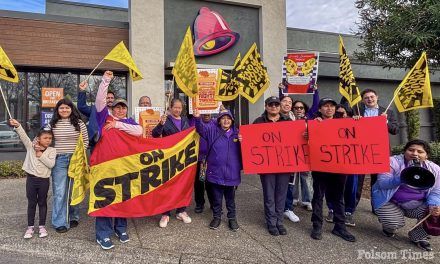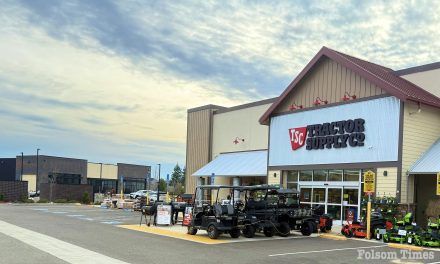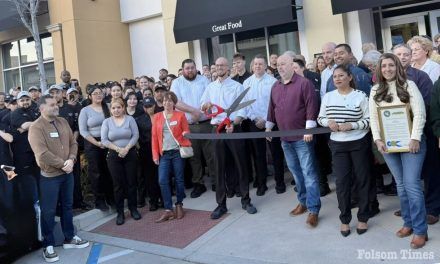Broadcaster and financial commentator shares candid outlook before moderating expert panel on technology, real estate, homebuilding, energy and healthcare at the annual forum
FOLSOM – The auditorium at Lakeside Church was abuzz Wednesday morning as business leaders, city officials, and community members gathered for Choose Folsom’s annual Future Folsom event. The highlight was unmistakable: a keynote address by legendary broadcaster and financial commentator Tom Sullivan, whose mix of humor, candor, and economic insight set the tone for a morning focused on Folsom’s future.
The keynote address was delivered by Sullivan, the veteran broadcaster and investment professional widely known for his work on Fox Business, KFBK, and KCRA. Over the course of his career, Sullivan has built a reputation for connecting Wall Street to Main Street through his decades as a stockbroker, financial manager, and broadcast commentator. He became one of Sacramento’s most recognized radio and television voices before moving onto the national stage at Fox Business, where he offered analysis on markets, policy, and the American economy. On Wednesday, Sullivan provided a detailed look at where the economy has been, where it may be headed, and how global trends continue to affect businesses and communities in the Sacramento region. His keynote also set the stage for further discussion and commentary that will be detailed in a forthcoming submission.
Sullivan, a familiar voice to anyone who’s tuned in to KFBK, Fox Business, or KCRA, took the stage with a blend of humility and nostalgia. “Thank you for coming today. These are not just, you know, standard speech words. I’m honored to be here. It’s really amazing to be here because I’m looking around Folsom and Joe said, well, talk about economic growth in Folsom,” he began, referencing Choose Folsom CEO Joe Gagliardi.
“I moved to New York nineteen years ago. So if you can imagine what I saw Folsom, California look like in 2006, that’s what I was expecting. And little—I mean, I can’t believe the economic development that is right before your eyes and I can’t imagine what’s on the plans for the future.” Sullivan’s affection for the region was clear, and he didn’t shy from poking fun at its quirks. “I moved to Sacramento in 1975 from the Bay Area and I remember my neighbors and some of the people I worked with were kind of lamenting. They were being nice, fairly. But they were going, oh, you people from the Bay Area are moving in and you’re changing our community. And what I’m finding out is that that’s still the same today. The people coming from the Bay Area and everybody’s griping about—nope, you’re all a bunch of NIMBYs in this town. You don’t want anybody to come in and enjoy what you have. But, but it was the same.”
From Sacramento Roots to National Spotlight
He reflected on the unique spirit of the region, sharing, “There’s something about Sacramento. People, when they leave it, they remember it as being probably the best place they’ve ever lived.” He recounted how even his late friend Rush Limbaugh and former KCRA anchor Margaret Kelly would reminisce about their Sacramento days, regardless of where their careers took them.
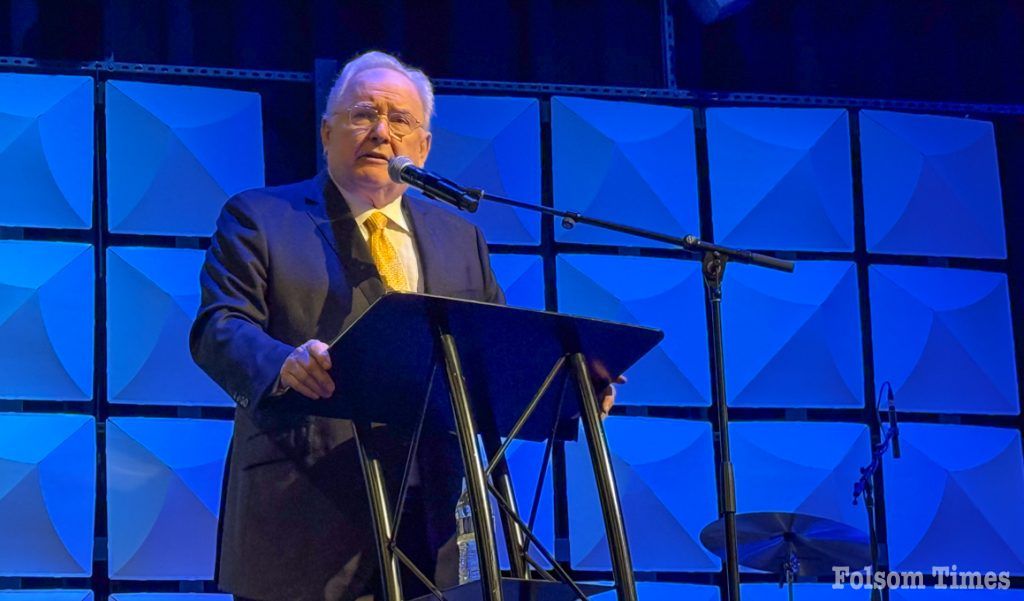
Sullivan’s keynote was more than a trip down memory lane. He delivered a candid, sometimes sobering assessment of the economic landscape—locally and nationally—peppered with the kind of practical wisdom that comes from decades in business and media. He praised local institutions, saying, “Of all the communities I’ve lived in, SMUD is by far the best utility I’ve ever dealt with—ever. They just are.” He also recalled the days when Folsom and the region were still rural: “There were cows on the side of Douglas Boulevard. It wasn’t that long ago—there were cows grazing on the side of Douglas Boulevard. So people say it’s a cow town. Yes. Actually, it was. At least out in Placer County it was.”
He reminisced about the ease of getting around the region before traffic became a daily reality, and shared, “I watched the growth of this community and it’s been a very short period of time in which this area has grown rather dramatically.”
Sullivan’s trademark humor and storytelling shone as he recounted his early days as a financial reporter. “I was brand new to television. I didn’t know any of this. But they put the little—they call them supers—the little name under the person that’s on the screen. And I went home and it said, Tom Sullivan, financial expert. Well, I had just come from the accounting profession where you didn’t brag about stuff. And I remember seeing ‘financial expert’ and I thought—I talked to them and I said, no. No. No. No. You can’t—don’t say financial expert. Say something else.” He laughed, recalling how quickly the label stuck. “Later that week, I was invited to speak to an Elks Lodge or something, anyway, in Sacramento. And the lady that introduced me got up and said, and now please welcome Tom Sullivan, a financial expert. And I thought, wow. That really works. You put it on television and you say you’re an expert, you are an expert.”
He connected these lessons to the business world, sharing a childhood story about selling World’s Finest Chocolate bars. “A guy opens the door and I said, would you like to buy a World’s Finest Chocolate? And he’s kind of a gruff old guy and he said, no. And I’ll tell you why. I’m a retired sales manager. You said, would you like to buy a World’s Finest Chocolate? He says, what you do is you say, how many would you like? The wording made all the difference in the world.”
Sullivan also recalled a formative moment with Billy Graham, who attributed his global success to “the gift of speaking simply.” Sullivan urged the audience, “If you really know your material, you don’t need to use big words. Use simple words that your customer can understand.”
He didn’t shy away from critiquing the rapidly changing media landscape. “People are not consuming media the way they used to. The audience for radio and for television is shrinking. Cable did a lot of damage to the broadcast networks. People started watching their favorite cable stations instead. Now they’re losing their audience because the demographics are—they’re older and they die. So the numbers are smaller. And the younger people are on their phones, that’s their media source, and they’re streaming. And Netflix is just continuing to just hit all kinds of new highs.”
He urged Folsom’s leaders to be proactive in telling their story. “If you want to build your brand and brag about Folsom, I think there’s bookers that are basically young men and women just out of college and what their job is is to find faces and names of people that are experts in something to put on television that day. If they know that you are willing to sit before a camera on a moment’s notice, you go to the top of the booker’s list. It makes their job easier.” And he didn’t miss the chance to celebrate Folsom’s fiscal discipline: “The mayor told me you folks cut spending? I’ve never heard of that. I mean, I think that should make national news.”
Candid Takes on Today’s Economy
Sullivan’s analysis of the economy was both insightful and relatable. “Companies—they’re not hiring, they’re also not firing. The layoff numbers are almost historically low and the hiring numbers are almost historically low. So if you’re not hiring, you’re not firing, what does that say? It says that companies don’t know what to do. They’re befuddled.” He spoke candidly about inflation, interest rates, and the Federal Reserve: “The Fed has been late on dropping rates and as a result, we’re watching the labor markets cooling off rather quickly. It’s more dramatic than I think a lot of people understand.”
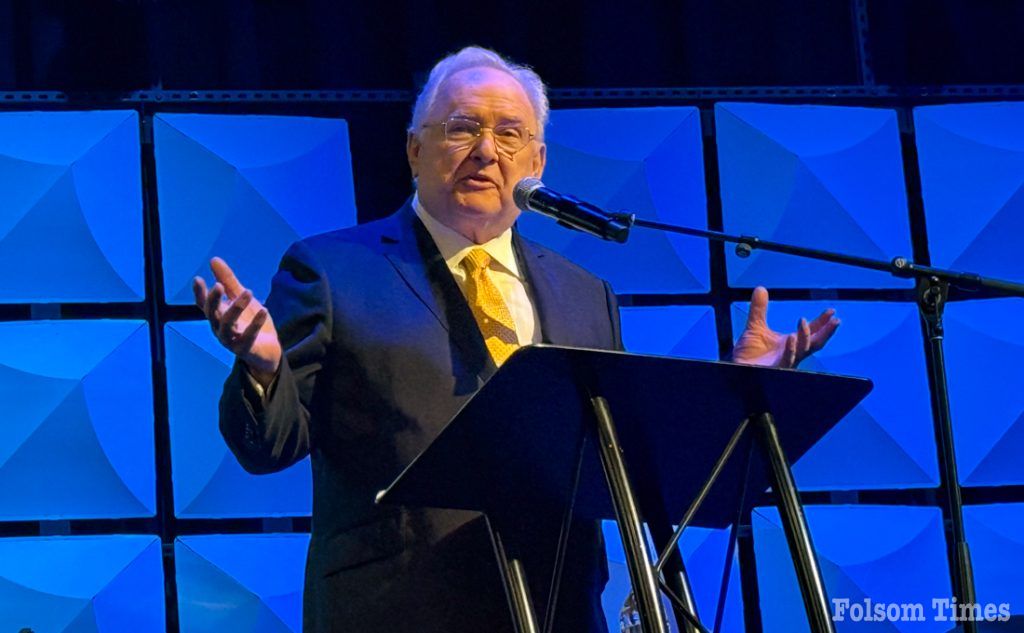
He addressed fears about the rise of AI and automation, but offered reassurance: “AI is going to change a lot and it’s going to add more profitability. Gonna be more productivity which will equal profitability. I am very bullish on AI. But I’m talking about youth can’t find a job—has nothing to do with AI.” He called for renewed investment in education and workforce development: “China is graduating ten engineers compared to one that we graduate in this country. And so the H1B visa thing is now a new fight. The problem today though isn’t that. The problem is that companies have hired, have hired, or are hiring every technology person they can hire. We’re not producing enough. So where are we going to get them from?”
He challenged the audience to think about success and time. “You will achieve as much as you want to achieve and no more. And until you reach that spot, you’re going to be hungry to get to that spot. If you look at the clock, we all have the same clock. We all have the same number of minutes in every hour. Same number of hours in every day. What you do with each one of those minutes makes a difference between success and non-success.”
Sullivan closed his speech with optimism for Folsom’s future, “I am thrilled to be here, and I hope you are too.”
Discussion Panel Explores Folsom’s Economic Frontiers
After a standing ovation, Sullivan seamlessly transitioned to moderating an expert panel, each representing a key sector of Folsom’s economy. The discussion offered attendees a dynamic, real-time snapshot of the city’s strengths and its challenges.
Technology
Vidhu Shekhar, Government Strategy Lead for U.S. State & Local Government in Microsoft’s Worldwide Public Sector, brought expertise in digital transformation and innovation in government. A former interim business strategy leader for Critical Infrastructure, Transportation, and Public Finance, Shekhar also shared his perspective as curator of the bookGenerative Artificial Intelligence Use Cases in State & Local Government. He described Folsom’s tech sector as “limitless,” crediting Intel’s legacy and highlighting the city’s growing venture capital ecosystem. “Moneta Ventures just raised $200 million—ten years ago that would have been out of the realm of discussion.” Shekhar explained that Folsom’s future in technology depends on three pillars: a strong education hub, anchor companies, and favorable policy. He also referenced the national Project Stargate initiative, emphasizing that data infrastructure and workforce are key to staying competitive in AI.
Commercial Real Estate
Todd Eschelman, Executive Managing Director for Newmark in Sacramento and Roseville, added perspective from the commercial real estate sector. With more than 30 years of experience and $1.8 billion in completed transactions, Eschelman has long represented landlords, tenants, buyers, and sellers across Northern California. His 2024 recognition as Office Broker of the Year underscored his leadership in the market. He pointed to the migration of Silicon Valley companies to the region, noting that “Intel influence always has a draw. All these companies are setting up to take advantage of the talent and the quality of life.” He described a recent deal moving SK Hynix’s U.S. headquarters to Rancho Cordova and highlighted the collaborative efforts between Folsom, Rancho Cordova, and regional economic development groups to market the area as a “mega region” to national and international investors.
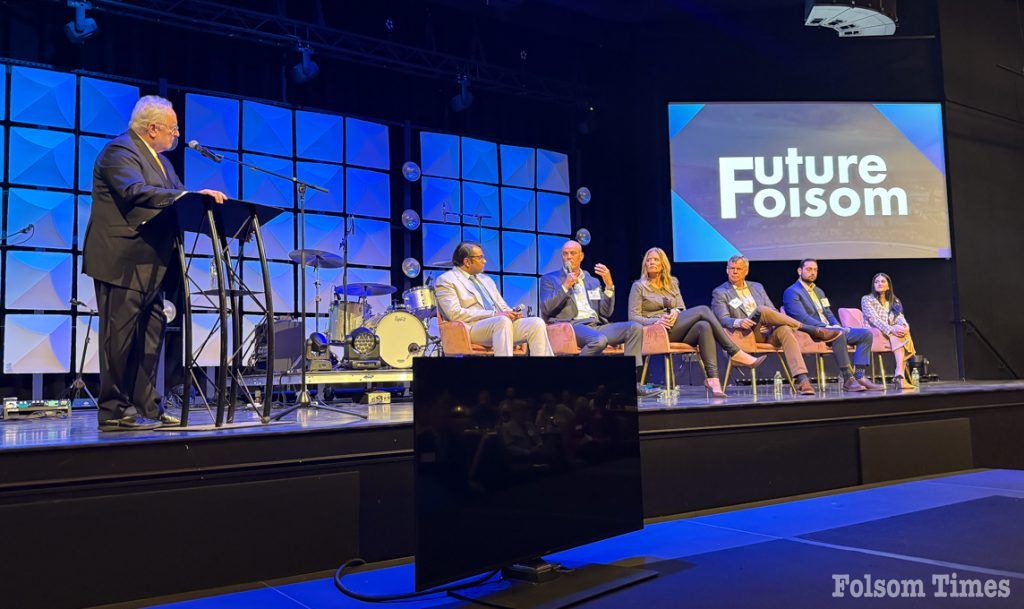
Residential Real Estate
Shelby Ryburn, co-founder of The MORE Real Estate Group (Keller Williams Folsom), reflected on her nearly two decades of experience in residential, multifamily, luxury, and senior community markets. As a top-producing leader of a team of 11 agents and among the top 1% of Keller Williams agents in Northern California, she spoke to the resilience of Folsom’s housing market. “The number one reason people buy and sell is because they have lifestyle changes. Most of the time they don’t have an option—they have to make a move.” Ryburn explained that despite higher interest rates, Folsom’s low inventory and high demand keep the market strong. She emphasized the importance of local market education, saying, “You can’t necessarily rely on what you hear on the national media.”
Homebuilding
Christopher B. Cady, Northern California Division President for Woodside Homes, contributed perspectives from the homebuilding industry. With nearly 30 years of leadership at companies including Beazer Homes, Pulte, KB Home, and AV Homes, Cady oversees all aspects of community launches, construction, and sales across Northern California for Woodside Homes. He discussed the challenges of land acquisition and rising costs, saying, “We are competing to put something out there in marketplace that will make these people in this room today give them the opportunity to live a better life.” Cady explained that builders are buying down mortgage rates to attract buyers and that innovation in product and partnerships with the city are critical for future growth. He noted, “Margin compression is tough, but we have to do that right now to move the product.”
Energy
Joshua Rasin, Manager of Advanced Technologies and Technology Acceleration at SMUD, shared insights into clean energy and innovation. His leadership in projects such as grid modernization, renewable integration, electric transportation, and carbon-reduction programs illustrated the role of utilities in shaping sustainable growth for the Sacramento region. “We have the ability to serve load, but we need to be thoughtful in how we do that.” Rasin explained that Sacramento’s balanced residential and commercial load, along with proactive infrastructure planning, positions Folsom to support growth in data centers and new housing. He also highlighted SMUD’s rates, which are “50% lower than our neighbors,” and the utility’s zero-carbon goals.
Healthcare
Dr. Namrita Gogia, a board-certified internal medicine physician with Mercy Medical Group – Dignity Health, spoke to the healthcare perspective. With more than a decade of clinical experience in Roseville and affiliations with Mercy San Juan Medical Center and Mercy Hospital of Folsom, Dr. Gogia emphasized the importance of healthcare access in communities experiencing population growth. “Us being here today, networking, meeting one another, none of that will be replaced. My guidance, my counsel to my patients will not be replaced by artificial intelligence.” She discussed the looming physician shortage and the need for expanded residency programs and retention strategies. “In ten years, we’re going to have a shortage of 100,000 physicians. We need to increase the residency programs.”
Panelists Converge: Education, Regulation, and Community Connection
Throughout the panel, participants agreed on the critical importance of education and regulatory reform. Shekhar and Dr. Gogia advocated for early STEM education and hands-on learning, while Ryburn stressed the need to teach “how to connect and how to love, and how to serve,” alongside technical skills. Eschelman reflected on the post-pandemic workplace, emphasizing the need for collaboration and human interaction in a world increasingly shaped by technology.
Cady and Rasin discussed the impact of tariffs and inflation on homebuilding and utilities, underscoring the need for policy stability and innovation. Shekhar noted, “AI will change, not eliminate, most jobs,” and called for Folsom to build on its strengths as a regional ecosystem.
As the event concluded, Choose Folsom CEO Joe Gagliardi thanked sponsors, panelists, and the Lakeside Church team, reminding attendees of the city’s collective strength. “You will achieve as much as you want to achieve and no more,” Sullivan had told the crowd earlier. In Folsom, that hunger for progress—and for community—is alive and well.
Future Folsom was made possible not only by the staff of Choose Folsom but by a number of community and business sponsors. Presenting Sponsors were Dignity Health – Mercy Hospital of Folsom and the Sacramento Municipal Utility District (SMUD). Platinum Sponsors included Dokken Engineering, Elliott Homes, Folsom Ranch, Inductive Automation LLC, Kaiser Permanente, Palladio, and Sutter Health Valley Area. Gold Sponsors were Atlas Disposal, Folsom Lake College and the Harris Center, Intel Corporation, JMA-Build Housing Ventures, Micron Technology, Inc., Murphy Austin Adams Schoenfeld LLP, R.E.Y. Engineers, SAFE Credit Union, Wells Fargo Bank, and Woodside Homes (SHAWOOD). Media Sponsors for the event were Chamber partners Folsom Times and Style Magazine.
Copyright © 2024, Folsom Times, a digital product of All Town Media LLC. All rights reserved. No portion of this publication may be reproduced, distributed, or transmitted in any form or by any means, without the prior written permission of the publisher.
